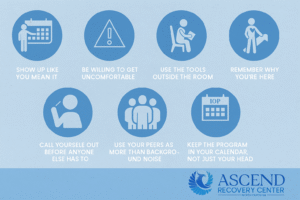You’re not here to waste time. If you’ve signed up for an Intensive Outpatient Program in Charlotte, North Carolina, you’ve already done something most people never do—you’ve said out loud, “I need more than what I’m doing right now.” That takes guts.
But here’s the thing: simply showing up to sessions isn’t enough. Recovery isn’t a spectator sport. An IOP is an engine for change, but it only works if you’re willing to turn the key and drive.
If you’re high-functioning, you already know how to look engaged while mentally being miles away. In IOP, that habit can keep you stuck. You can coast through it and check the box, or you can lean in and let it change you.
Here’s how to make your IOP experience work as hard for you as you’re working for it.
1. Show Up Like You Mean It
High-functioning people often run on autopilot—especially in environments where they can blend in. You know how to give the right nods, ask the right questions, and keep the deeper stuff safely locked away.
But in IOP, that polished mask works against you. This is the one place you don’t need to keep the performance up. Show up with your actual thoughts and feelings, even if they’re messy, contradictory, or embarrassing.
It’s not about dumping every detail—it’s about being honest enough that your counselor and peers can actually meet you where you are. If you don’t give them a clear view, they can’t offer the right tools.
2. Be Willing to Get Uncomfortable
If you leave every session feeling comfortable, you’re not going deep enough. The real progress often feels awkward or even painful in the moment.
Maybe you’re debating whether to bring up the fight you had with your partner. Maybe you’re cringing at the thought of sharing a relapse trigger that feels “too small” to matter. Those are exactly the moments that can open doors—if you risk stepping through them.
Think of it like going to the gym. You don’t build muscle without tension. You don’t build recovery without discomfort. The goal isn’t to stay in pain forever—it’s to use that discomfort as a launch point.
3. Use the Tools Outside the Room
Everything you hear in IOP is meant to be lived, not just discussed. Your counselors will introduce coping strategies, communication frameworks, boundary-setting techniques, and ways to navigate triggers.
These are not homework for the sake of homework. They’re field tests for your real life. If you only use them in the safety of a session, you’re missing the point.
Try them out in the middle of your week, during the messy moments:
- When you’re sitting in Charlotte traffic and your patience is paper-thin.
- When a coworker’s comment stings and you want to escape into old habits.
- When your mind starts spiraling at night and you’re tempted to distract yourself instead of sitting with the feeling.
Each time you practice outside the room, you’re strengthening the connection between what you’re learning and how you actually live.
4. Call Yourself Out Before Anyone Else Has To
One of the most dangerous skills high-functioning people have is the ability to believe their own excuses. You can wrap procrastination in “self-care” or avoid accountability with “I’ve been too busy.”
In IOP, waiting for your counselor to call you out wastes valuable time. Instead, practice noticing your own patterns before someone else points them out.
If you skipped journaling this week because you “didn’t have time,” own it in group. If you avoided a hard conversation because you were “waiting for the right moment,” admit that the moment didn’t come because you didn’t want it to.
This level of self-honesty is uncomfortable, but it accelerates your progress in ways passive participation never will..

5. Use Your Peers as More Than Background Noise
It’s easy to get tunnel vision and focus only on your own story in group sessions. But every person in that room is carrying experiences, mistakes, and wins that can become shortcuts for your own learning.
When you listen closely to someone whose life looks nothing like yours, you start seeing universal patterns. You recognize your own thinking in their words, and you catch warning signs in their story that you might have missed in your own.
If you’re willing to stay open—even to people who challenge your worldview—you’ll leave IOP with a toolkit far bigger than just your own experience.
6. Keep the Program in Your Calendar, Not Just Your Head
Life in Charlotte doesn’t pause for recovery. Between work deadlines, UNC Charlotte classes, and kids’ after-school schedules, your IOP can get squeezed out if it’s not firmly anchored in your week.
Put your sessions on your calendar like immovable appointments. Treat them with the same urgency you’d give a critical meeting with your boss or your child’s school play.
If something urgent comes up, reschedule your session immediately rather than telling yourself you’ll “make it up later.” In recovery, “later” often turns into “never.”
7. Remember Why You’re Here
Motivation comes in waves. There will be days when you don’t want to get in the car. Days when the thought of talking about your feelings sounds exhausting. Days when you wonder if any of it is worth it.
When that happens, rewind to the moment you decided to start IOP. Remember the specific frustration, fear, or hope that pushed you to take this step.
You didn’t come to maintain—you came to move forward. Keep that reason in view, even when the work feels heavy.
The Bottom Line
Getting the most out of IOP isn’t about perfection—it’s about presence. It’s about showing up with your real self, not your rehearsed one. It’s about taking what you learn in the room and testing it in the wild chaos of life.
If you commit to full participation, stay open to discomfort, and practice relentlessly, you’ll leave IOP with more than just a certificate. You’ll leave with tools, insights, and the confidence that you can face life on its own terms—without numbing, hiding, or faking it.
Call (844) 628-9997 to learn more about our Intensive Outpatient Program IOP services in Charlotte, North Carolina.
Frequently Asked Questions About Making the Most of IOP
How many sessions per week are typical for an Intensive Outpatient Program?
Most IOPs meet 3–5 times a week, with each session lasting about three hours. At Ascend North Carolina, we offer flexible scheduling so clients can balance work, school, and family life.
What’s the difference between just attending and actively participating?
Attending means being physically present. Participating means sharing openly, engaging with feedback, practicing skills outside of sessions, and applying what you learn in real life.
Do I have to share everything about my life in group?
No, you choose what to share. But the more honest and specific you are, the more likely you are to receive feedback and support that truly fits your needs.
What if I don’t connect with someone in my group?
That’s normal. In fact, learning from people you don’t naturally click with can be one of the most valuable parts of IOP. Discomfort can be a teacher.
Can I keep my IOP private from my employer or professors?
Yes. You can simply say you have ongoing health appointments. You’re not obligated to disclose details unless you want to.
What if I feel like I’m not making progress?
Speak up. Your treatment team can help identify what’s getting in the way—whether it’s unspoken resistance, outside stressors, or simply needing to try different strategies.


